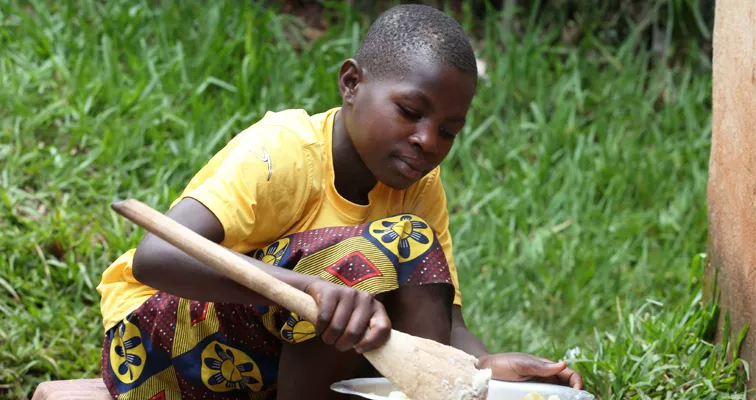Surviving the streets in Rwanda: How one child found her way back home

Nine-year-old Abijuru* was one of many orphaned or abandoned children living on the streets of Rwanda. Yet, she had a mother who longed to care for her.
At first, Abijuru followed other neighbourhood children to the centre of Kigali, Rwanda’s capital. There, she cupped her hands, holding them out to passing pedestrians. Sometimes, she earned just a little to take back home. Leftovers from restaurants occasionally eased her hunger.
"I was on the streets to survive. When you are hungry, thinking about much of anything becomes challenging. The goal was always to find something to eat and a way to make money to support my mother,” explained Abijuru.
Over time, she spent more nights on the streets than at home with family. The rolling hills of Nyanza Mountain were challenging to climb on an empty stomach. Eventually, she slept on the streets every night. Abijuru lived from hand to mouth, hiding from local security guards and begging for money and food. Alone at nine years old.
Children living on the streets
“Children are dying on the streets in Rwanda without anyone taking notice. Children that no one mourns for and children that have no one to account for them,” said Jean Bosco Kwizera, National Director of SOS Children’s Villages Rwanda.
The number of children living on the streets surged during the pandemic. Rwanda’s National Rehabilitation Services estimates that 17,960 children now live on the streets, with many more roaming by day and returning home at night without adult supervision.
Addressing immediate needs
Economic decline has worsened poverty, the main driver of children ending up on the streets. SOS Children’s Villages Rwanda recognized the need to shift resources to support vulnerable families through economic empowerment, skills development, small business loans, and assistance with school fees.
The village model, where children without parents live in a family-like setting, has been lifesaving in a country that experienced genocide in 1994, and the number of children without parental care was very high. Over time, most children in SOS Children’s Villages care transitioned to family members or foster families in their communities.
At full capacity, SOS Children’s Villages Rwanda could accommodate 600 children. Today, 134,000 people benefit from its alternative care and Family Strengthening Programs.
This shift has freed up resources and space to help reach thousands of those tiny, cupped hands. No child deserves to sleep on the streets, not even for a single night.
Push and pull factors
Abijuru was only four but vividly remembers the fear the family endured when her father came home drunk, often committing violent acts against her mother.
“We had a good marriage during the first few years. We worked together as a family and managed to earn enough to buy a motorbike, which provided additional income. Everything changed when my husband began drinking and taking drugs,” said Costasie*.
He sold the motorbike and the family’s small store to finance his addiction. “We lived in fear for many years, and it was a relief when they divorced,” said Abijuru.
As a single mother with four children to support, Costasie struggled to make ends meet. “I did my best to help my mom. I washed clothes for neighbours, but it wasn’t enough. We could not afford food. I couldn’t continue going hungry at home. I had to do something to survive,” said Abijuru.
The harsh reality of street life
Watching her daughter disappear more frequently was heartbreaking for Costasie. “I felt like I had failed as a mother.”
On the streets, survival is hard. Abijuru faced assault, exploitation, and relentless physical labour. Children like her often beg, search through trash, steal food, or take on backbreaking work, such as carrying bricks at construction sites. To protect themselves, groups of three to four children often band together, sleeping and working together to mitigate danger.
Safe havens for children at risk
To protect vulnerable children, Rwandan authorities established transit centres as temporary shelters. Children under 12 who consent are entrusted to SOS Children’s Villages, where they receive care, regular meals, a safe place to sleep, and emotional support.
Every child is unique and needs time to adjust, making stability essential. Through counselling, therapy, and life-skills training, children gradually open up about their backgrounds, enabling SOS Children’s Villages to trace their biological families and assess whether returning home is safe.
On average, children spend six to nine months in SOS rehabilitation programs. Although family reintegration is not always possible, many parents work hard to improve their circumstances so they can be reunited with their children. Poverty, the most common barrier, is addressed by strengthening families’ capacity and helping them secure sustainable livelihoods.
Returning home
After two years on the streets and three months at the SOS Children’s Villages Rehabilitation Centre, Abijuru finally returned home. SOS Children’s Villages helped her mother reopen a small vegetable store, enabling her to provide her children with two meals a day. Although not yet fully self-sufficient, the SOS Family Strengthening Program covers the children’s school fees, giving Abijuru her first opportunity to attend school.
“I thank God for the opportunity to go to school. I have never done that before. The help my mom received to run her store meant everything for our wellbeing.”
A mother’s hope for the future
“The sole reason Abijuru was on the streets is poverty. A stable income is the key to a good life. I hope to lease more land to expand my vegetable farming so I can continue to prioritize my children’s education and future,” says Costasie.
*Names changed to protect privacy.
